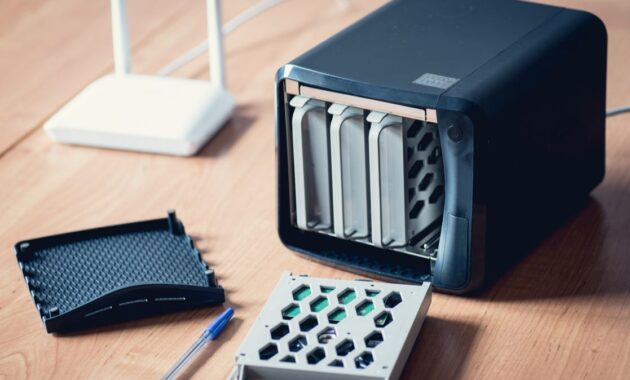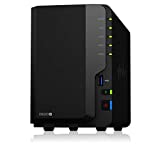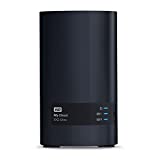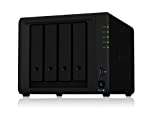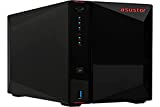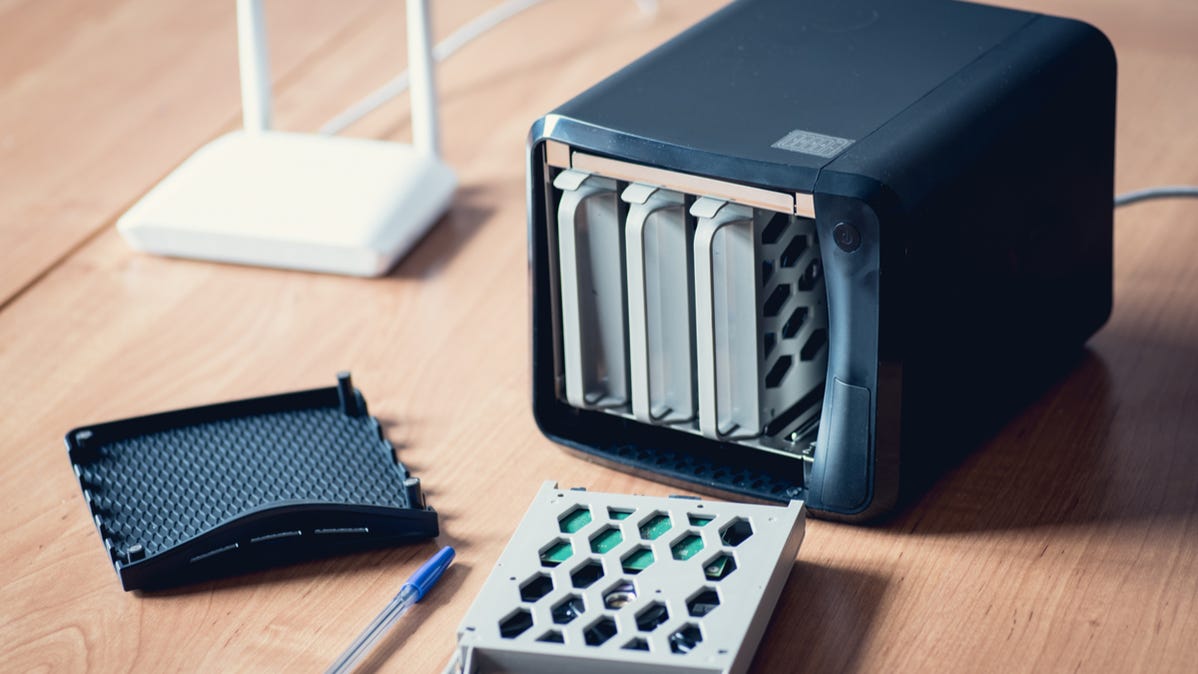
What to Look for in a NAS in 2023
While every NAS fulfills the basic function of attaching storage to your network, that’s where the similarities end. A NAS hard drive is essentially a specialized computer and, like all computers, comes in many varieties. The key aspects you need to consider before buying one can be broken down into a few broad categories.
The number of drive bays is the first decision you need to make. A single-bay NAS (or even a simple external hard drive) is fine for users who only want to stream media, create basic backups, or have fast local shared storage. However, with just one bay, all data is lost should the drive fail.
A two-bay model allows for disk mirroring and is a better choice ensuring your data stays intact. Going beyond two drive bays comes down to your desired mix of maximum capacity, speed, and redundancy.
Performance specifications on NAS devices are as important as those of a personal computer when choosing a product. The NAS has a CPU, RAM, specific Ethernet port speeds, and maximum drive specs that you’ll need to be aware of. For example, if you need a NAS to transcode 4K video or edit video files directly over the network, it needs the hardware horsepower to make that possible.
Upgradability is also an important factor to consider. If your needs are going to grow over time, then having a NAS that can be expanded makes for a better purchase. RAM is a common upgradeable component, but some NAS devices also allow you to install an SSD to act as a high-speed cache, dramatically improving data transfer performance.
Finally, application support can be crucial. NAS devices use different operating systems than a standard computer, usually. Some of these OSes can be customized, while others could be a little more than a standard Linux installation. Support for specific applications such as web servers or media streaming software can vary wildly, so check whether a given NAS device supports the specific applications you need it to run.
Frequently Asked Questions
What does network-attached storage mean?
–
Network-attached storage (NAS) refers to a device that creates a centralized network of files and folders that users on a local area network (LAN) can access. NAS devices allow for the easy sharing of data and files, typically in a collaborative situation or when a private cloud is needed for small businesses. In most instances, network-attached storage can be accessed via a dedicated desktop or mobile app.
How many bays do I need for my NAS device?
+
The number of bays dictates how much memory your NAS device will have. For example, a NAS with 2 bays may only have 2TB of storage while one with 4 bays may have 8TB. Each NAS device bay houses the physical drive that contains the stored files and folders. Larger enterprises should consider a NAS device with more than two bays to not limit the space they have to work with.
Can I use any hard drive with a NAS device?
+
Standard hard drives are not designed to withstand the constant work that a NAS device performs. Unlike a typical PC, a NAS device is running 24/7. This sort of wear and tear would degrade a standard hard drive faster than a NAS-rated hard drive. While you can use a standard drive in your NAS device, it’s not recommended and puts your files at risk.
What is Plex?
+
Plex is a free streaming service that doubles as a media player capable of storing and playing your media. Media stored on a NAS can be accessed and streamed via a designated Plex server.
Best NAS Overall: Synology 2 Bay NAS DiskStation DS220+ (Diskless)
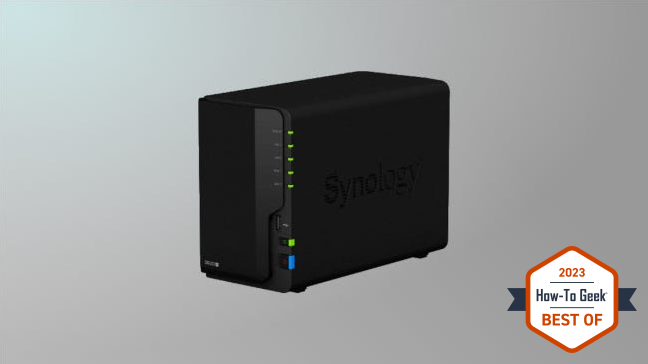
Pros
- ✓ The best jack-of-all-trades NAS with a fair price
- ✓ Offers RAID 1 disk mirroring for the basic redundancy most people require
- ✓ Dual Gigabit LAN with either failover or link aggregation
- ✓ Surprisingly powerful CPU and upgradable RAM
- ✓ Fast read and write speeds
- ✓ Competent basic Plex solution
Cons
- ✗ A bit too expensive for casual buyers
The DS220+ has a lot going for it. It looks attractive and works in a home or business setting. The price is not low, but it’s not excessive either. With two drive bays, you get the most important minimum level of redundancy with RAID 1 support.
The dual gigabit Ethernet ports give you the option of either aggregating them for maximum performance or using a failover setup to ensure your data is always available. The CPU is fast enough for most user needs, and the RAM allocation can be upgraded if needed. Being the household name in the NAS market, Synology also offers nearly 100 applications for the DS220+.
The DS220+ is a hard product to criticize because it seems like you’re getting more than your money’s worth no matter how you look at it. We can’t imagine most users with a budget in this region buying this NAS and being unhappy with it. If you’re still not sure, though, Review Geek’s article on the DS220+ is sure to convince you.
Then again, if you’re not a fan of the Synology software platform and ecosystem, then the DS220+ isn’t going to change your mind on that front. But if anyone asks us which NAS they should get, this is the one we’d point to as the first stop on the road to NAS nirvana.
Best NAS Overall
Synology 2 Bay NAS DiskStation DS220+
☆☆☆☆☆ Link Icon Read Review Geek’s Full Review
Synology’s DS220+ is one of the best NAS devices around, and perfect for most anyone’s needs. It’s good for archiving data, can be used with Plex, and is relatively inexpensive.
Best Budget NAS: Synology DS120j 1 Bay NAS DiskStation
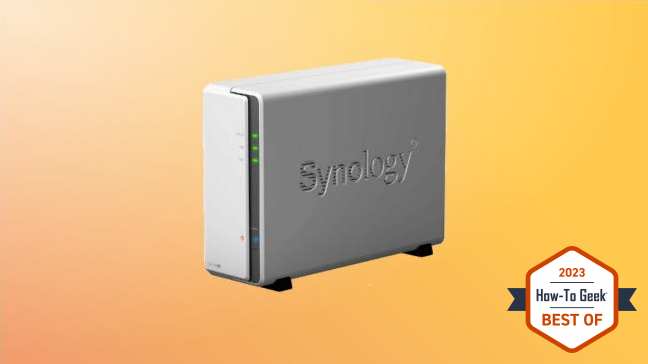
Pros
- ✓ Extremely cheap, especially if you use it with a drive you already have
- ✓ Read/Write speeds are actually pretty good for the price
- ✓ A feature-complete NAS for very little money
Cons
- ✗ Having just one drive removes any redundancy
- ✗ CPU and RAM aren’t up to media transcoding or any heavy lifting
- ✗ Risky as your only backup solution
When does “budget” become cheap? Some might argue that a NAS with only one drive bay defeats the point of having such a device. However, not everyone who wants a NAS is looking for speed or additional reliability.
If you’re only looking for an inexpensive and simple way to add local file storage to your network, then the Synology DS120j has you covered. It’s modest in every sense of the word, but for the price, it’s got a surprising number of tricks on offer.
While it may only have a single drive bay, the DS120j can accept a drive up to 16TB in size. Most users would find a storage amount more than acceptable. With an encrypted read speed of 112MB/s, drive performance is balanced with its single Gigabit Ethernet port.
It may only have an 800Mhz dual-core CPU, but a dedicated hardware encryption engine makes it so CPU performance isn’t affected. That being said, the DS120j isn’t going to do any heavy media transcoding work at the best of times, so keep that in mind if you’re trying to set up a NAS for Plex.
You get the same versatile Synology software as the best overall pick and based on user reviews, most have no trouble setting up and using this NAS. That’s a great sign, given that this is a real network-attached storage unit with the software flexibility and complexity that the name implies. If all you want is flexible, shared local network storage, the DS120j will get the job done for as budget-friendly as possible.
Best Budget NAS
Synology DS120j 1 Bay NAS DiskStation
Getting a NAS set up for just $100? That seems too cheap, but the DS120j is anything but. Provided you’re not doing any media transcoding, this is a solid NAS choice.
Best Home NAS: WD 4TB My Cloud EX2 Ultra
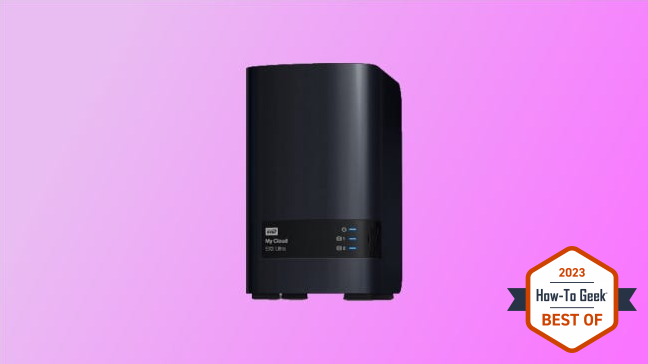
Pros
- ✓ Plug-and-play solution with included storage out of the box
- ✓ Decent CPU and RAM combo at this price
- ✓ Supports Plex Media Server and comes with 3-month trial
- ✓ Suitable for non-technical users
- ✓ Mac Time Machine compatible
Cons
- ✗ Limited app availability
- ✗ Some user reviews cite reliability issues and trouble accessing the NAS over the internet
While the average computer geek will not be phased by buying and installing drives into a NAS device, most home users looking for network storage solutions typically lack the know-how or time to build a custom unit. The WD My Cloud EX2 Ultra is the perfect solution for those folks to hit the ground running.
We’ve linked the 4TB model here, but you can buy up to 28TB variants of this NAS, so you can get the storage space you need. There is even a diskless model, in case you’ve already got the drives you need.
The case for the Cloud EX2 Ultra as the perfect home NAS candidate is further bolstered by its software. A common theme among users is how easy configuration is, and the EX2 Ultra is even Mac Time Machine compatible. But, that simplicity comes at a cost.
While NAS devices from companies like Synology offer you a long list of applications and powerful, finely-grained control over your device, Western Digital does not. Instead, you’re presented with basic functions, a limited number of optional apps, and a lot of hand-holding. While power users might see this as a downside, home users who want to get the job done without a course in network engineering will appreciate this ease of use.
It’s also worth noting that Western Digital has focused on equipping the EX2 with fast hardware, specifically with a focus on media streaming performance. You even get a three-month Plex trial included in your purchase, so home users looking for a solid Plex solution should definitely have the EX2 on their shortlist.
Best Home NAS
WD 4TB My Cloud EX2 Ultra
WD’s My Cloud NAS is perfect for many home setups. This one includes storage right out of the box and is compatible with Plex servers.
Best NAS for Business: Synology 4 bay NAS DiskStation DS920+
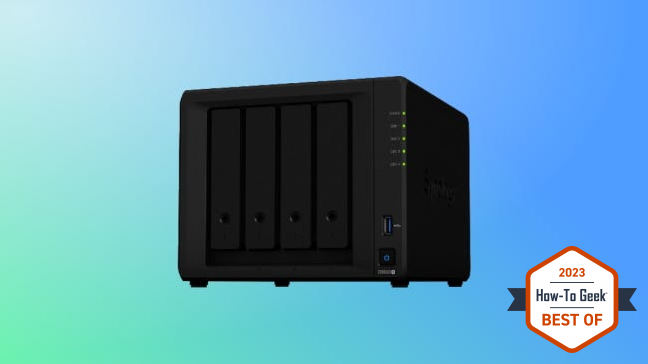
Pros
- ✓ Well-specified base system
- ✓ Lots of room to grow with RAM and M.2 SSD cache drives
- ✓ Fast sequential read and write speeds
- ✓ Hardware encryption
Cons
- ✗ Might be a little too expensive upfront for very small startups
There are many important considerations when buying computer equipment for business use. Typically, you want something reliable, durable, and can handle more complex workloads than home users require.
Most importantly, perhaps, is the ability for it to grow with your business over time. If you can start with a smaller initial investment and then upgrade a NAS as you go, that would be ideal from a cost-benefit perspective. The Synology DS920+ ticks all of those boxes and does it at a reasonable price.
The DS920+ is a 4-bay diskless NAS, so you’ll have to buy and add the disk drives yourself. You may think that the asking price is a little steep considering that no drives are included, but it’s a bargain upon further inspection.
This is an Intel-based quad-core NAS with 4GB of RAM as standard and the option to upgrade it to 8GB of RAM. It offers hardware-based encryption as well, culminating in a 225MB/s sequential read and write performance rating.
The most impressive performance feature, however, is the two M.2 NVME slots. NVME drives you insert into these slots are not used for file storage. Instead, they act as a high-speed cache for frequently used data. So if everyone in the office is working on the same project files, there will be no access contention once that data is cached to the NVME SSDs.
Of course, adding NVME drives is yet another additional cost, but it’s a perfect future upgrade once your demands for the NAS start to grow. Additionally, this NAS has two Gigabit Ethernet ports that can be used in an aggregated mode, ensuring that you get the full benefit of its disk input/output, or IO, performance.
If you’re running a small to medium-sized business and don’t have a huge budget for network infrastructure, the DS920+ is in the sweet spot. With a few upgrades, it should pull its weight long after it’s paid for itself. Not to mention, Synology has a large selection of add-on packages for their NAS products, many of which are invaluable in a business setting.
Best NAS for Business
Synology 4 bay NAS DiskStation DS920+
If you’re looking for a NAS for business, you need something that will scale as you grow. The DS920+ will do just that.
Best NAS for Plex and Media Streaming: Asustor AS5202T
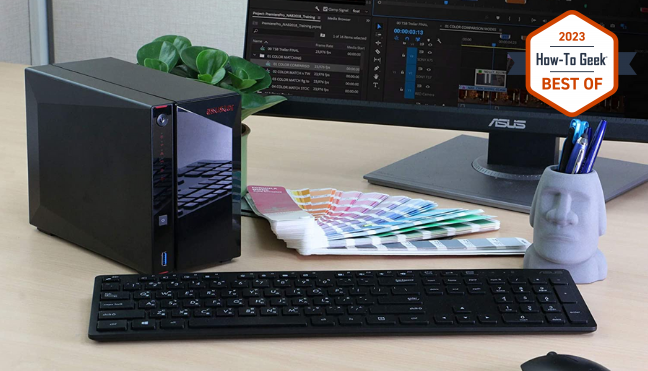
Pros
- ✓ Listed in the Plex database for up to 4K hardware transcoding
- ✓ Good specifications to handle media encoding
- ✓ RAM is expandable if needed down the line
- ✓ 2 x 2.5 Gigabit ethernet
- ✓ Direct HDMI Port for a local TV
Cons
- ✗ Requires a paid Plex Pass to get the most from the hardware
- ✗ Gamer aesthetic and features may not appeal to some
In-home media streaming is one of the main reasons most people are looking at a NAS. The popularity of Plex is a driving factor in looking into these network computer boxes. Most people start off running a Plex server on their desktop or using a spare computer. However, as your collection of media (and transcoding needs) grow, an old unused computer doesn’t cut it anymore.
Plex is compatible with a wide range of NAS devices that will run its app, but many of them are limited to software transcoding. That means available CPU resources determine whether you’re getting smooth, crisp playback or a blurry, stuttering mess. Ideally, you want a NAS that offers dedicated hardware encoding and certified compatibility with Plex.
The first place anyone should look on this quest is Plex’s official NAS compatibility list, and that’s where you’ll find the Asustor AS5202T. It’s one of the few NAS devices at this price point that offers hardware-accelerated transcoding of 4K footage, although it’s limited to SDR and H.264 output at that resolution.
Additionally, hardware acceleration support requires a paid Plex Pass subscription, so if you only want to rely on software encoding, you’ll have to buy a NAS with much more CPU power than this device. Still, if you’re buying a NAS specifically for Plex, it’s a fair assumption that you’ll also want Plex’s premium features, in which case this is a great match.
If you want to watch high-quality 4K HDR content, the AS5202T has an HDMI output for direct connection to a display, so you don’t even have to worry about wi-fi performance for your main television. This is a NAS that’s truly built for media consumption.
Best NAS for Plex and Media Streaming
Asustor AS5202T
If you’re looking for a NAS mainly for media and Plex, you can make it easy with the Asustor AS5202T. This NAS allows 4K transcoding at a great price point.
Best NAS for Mac: WD 4TB My Cloud EX2 Ultra NAS
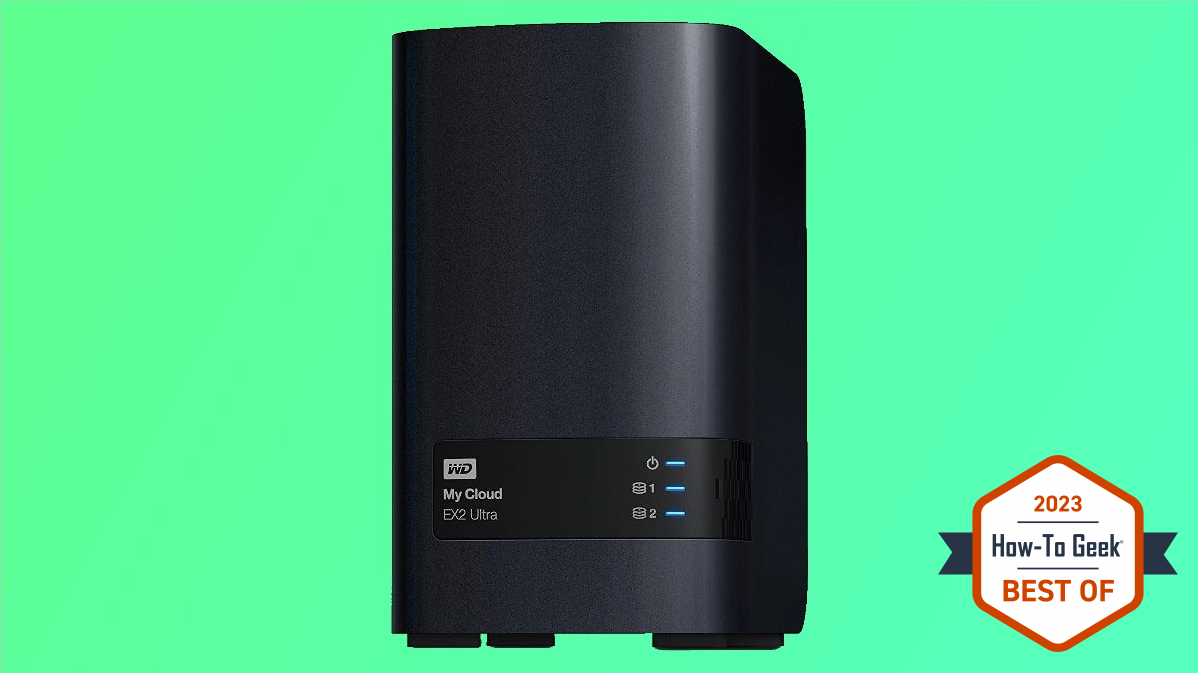
Pros
- ✓ WD My Cloud is easy to use
- ✓ Time Machine Support
- ✓ Dual drive functionality
- ✓ Lag-free streaming
Cons
- ✗ Slower transfer speeds
- ✗ No third party app
Too often hardware is designed specifically to work with Windows. The WD 4TB My Cloud EX2 Ultra NAS crosses the aisle and offers network storage for Mac users, as well.
But what does that mean, since most NAS devices are already Mac-compatible? It’s all about optimization for what users are more likely to utilize the NAS for. In the case of Mac users, you’ll want a network storage device that’s quick and intuitive which, for the most part, WD’s 4TB EX2 Ultra is.
The lightweight unit provides 4TB of centralized storage for important files needed across the entire network of users. For simplicity, WD opted for a pre-configured dual-bay arrangement for a pair of 2TB drives that can be easily accessed and configured to your needs. The NAS also comes in 8TB, 12TB, 16TB, 28TB, 32TB, 36TB, and diskless options.
Despite having two drives to manage, creating a backup folder and managing each drive is considerably intuitive thanks to software like the WD My Cloud mobile and desktop apps. Like the NAS device, the desktop and mobile apps are available on Mac and Windows computers, though the Mac version tends to fair a bit better.
While the NAS device works wonders in creating a functional and accessible network, you may find that the write speeds could be improved. The 1.3GHz dual-core Marvell Armada A9 processor and 1GB DDR3 RAM ensure an optimal speed for lag-free streaming. Unfortunately, you won’t hit any impressive speeds when transferring files.
The EX2 Ultra comes with 2 USB 3.0 ports and a Gigabit Ethernet port, and a button on top releases the drive bay door.
Best NAS for Mac
WD 4TB My Cloud EX2 Ultra NAS
Lag-free streaming and seamless cloud navigation. The 4TB WD NAS is designed to give Mac users everything they need from their network area storage.
The Best NAS Hard Drives of 2022
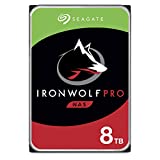
Best NAS Hard Drive Overall
Seagate IronWolf Pro 8TB NAS
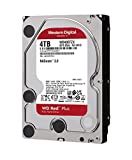
Best Value NAS Hard Drive
Western Digital Red Plus 4TB NAS
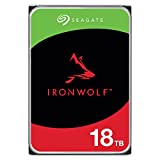
Best High Capacity NAS Hard Drive for Home
Seagate IronWolf 18TB NAS
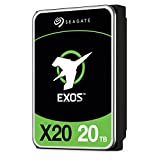
Best High-Capacity NAS Hard Drive for Business
Seagate Exos X20 20TB Enterprise HDD

Best NAS Solid State Drive
